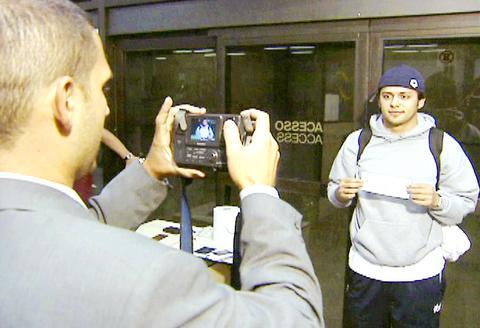Brazil said Friday it would not end court-ordered photographing and fingerprinting of US visitors, a tit-for-tat response to a similar US measure, despite grumbling over the US action.
"I consider the act itself absolutely brutal, an attack on human rights, a violation of human dignity, xenophobic and as bad as the worst horrors sponsored by the Nazis," Judge Julier Sebastiao wrote of the US measures, in his decision ordering Brazilian authorities to fingerprint and photograph all US visitors.
Brazil's policy is to treat foreign visitors as their countries treat Brazilians.

PHOTO: REUTERS
Beginning Jan. 5, US immigration officials at all international airports will vet visitors' passports and visas and pose the usual questions -- before taking their photographs and inkless digital fingerprints.
Visitors from 27 countries whose citizens may enter the US without a visa are exempt from this "biometric identification." The list of 27 is made up mostly of European countries and does not include Brazil.
A Brazilian foreign ministry spokesman told reporters Friday that the government could appeal the court order, but "never considered it."
Brazilian police photographed and fingerprinted US citizens arriving at Sao Paulo international airport. Police in Rio de Janeiro told the Brazilian news agency, Agencia Brasil, that they had not received official instructions, but would begin the procedure today.
Biometric identification was taken from about 230 US citizens, many of whom made clear displeasure, according to police.
The US said Friday that it was Brazil's right to impose such requirements, but deputy US State Department spokesman Adam Ereli said in Washington, "Our consulates general in Sao Paulo and Rio de Janeiro are monitoring developments on this issue closely."
Ereli said the US had no plans to complain or even discuss the regulations with Brazilian authorities as "countries have the sovereign right to determine the entry requirements for foreign nationals who apply for admission to their individual country."
"This is their sovereign right to do if they want to do it," he told reporters.
Rio's mayor, Cesar Maia, protested the Brazilian counter-measures, saying, "It makes us an international laughing stock ... when Rio has just gotten some international visibility hosting large sporting and tourist events."
"Brazil wants to be treated on an equal footing on every level and 2004 might give standing to new friction," National University of Brazil political science professor David Fleischer reporters.

Nvidia Corp chief executive officer Jensen Huang (黃仁勳) on Monday introduced the company’s latest supercomputer platform, featuring six new chips made by Taiwan Semiconductor Manufacturing Co (TSMC, 台積電), saying that it is now “in full production.” “If Vera Rubin is going to be in time for this year, it must be in production by now, and so, today I can tell you that Vera Rubin is in full production,” Huang said during his keynote speech at CES in Las Vegas. The rollout of six concurrent chips for Vera Rubin — the company’s next-generation artificial intelligence (AI) computing platform — marks a strategic

Enhanced tax credits that have helped reduce the cost of health insurance for the vast majority of US Affordable Care Act enrollees expired on Jan.1, cementing higher health costs for millions of Americans at the start of the new year. Democrats forced a 43-day US government shutdown over the issue. Moderate Republicans called for a solution to save their political aspirations this year. US President Donald Trump floated a way out, only to back off after conservative backlash. In the end, no one’s efforts were enough to save the subsidies before their expiration date. A US House of Representatives vote

REVENUE PERFORMANCE: Cloud and network products, and electronic components saw strong increases, while smart consumer electronics and computing products fell Hon Hai Precision Industry Co (鴻海精密) yesterday posted 26.51 percent quarterly growth in revenue for last quarter to NT$2.6 trillion (US$82.44 billion), the strongest on record for the period and above expectations, but the company forecast a slight revenue dip this quarter due to seasonal factors. On an annual basis, revenue last quarter grew 22.07 percent, the company said. Analysts on average estimated about NT$2.4 trillion increase. Hon Hai, which assembles servers for Nvidia Corp and iPhones for Apple Inc, is expanding its capacity in the US, adding artificial intelligence (AI) server production in Wisconsin and Texas, where it operates established campuses. This

US President Donald Trump on Friday blocked US photonics firm HieFo Corp’s US$3 million acquisition of assets in New Jersey-based aerospace and defense specialist Emcore Corp, citing national security and China-related concerns. In an order released by the White House, Trump said HieFo was “controlled by a citizen of the People’s Republic of China” and that its 2024 acquisition of Emcore’s businesses led the US president to believe that it might “take action that threatens to impair the national security of the United States.” The order did not name the person or detail Trump’s concerns. “The Transaction is hereby prohibited,”